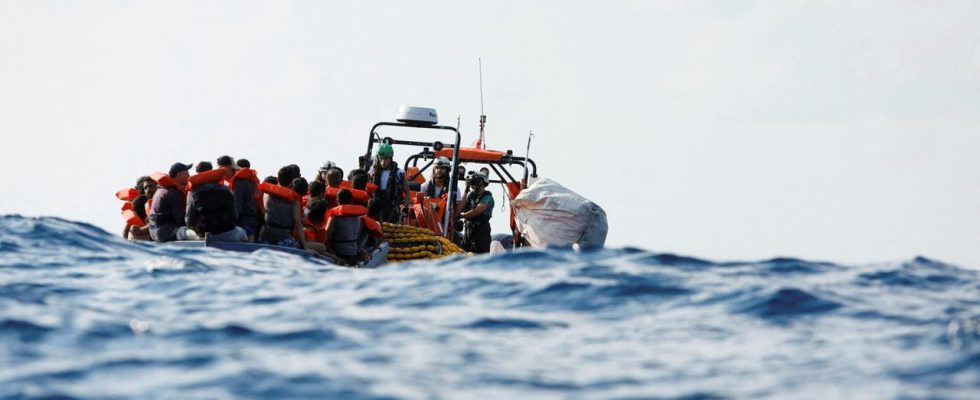Countries like Italy and Malta often take action against private sea rescuers. Aid organizations speak of a violation of the law and are calling for help from the EU. But there is no agreement in Brussels.
Last year, Rome issued strict rules for the use of private sea rescuers. Because these are a problem that must be solved, as Italy’s Foreign Minister Antonio Tajani justified the tougher approach at a ministerial meeting in Brussels. Since then, civilian rescue ships have been detained by the Italian authorities in over 20 cases, says Oliver Kulikowski, spokesman for the aid organization Sea Watch.
“Most recently this affected ships belonging to the organizations Doctors Without Borders, Sea Eye, SOS Humanity and Sea Watch,” said Kulikowski. “And at the same time, Italy has started assigning ships to very distant ports.” Last year, the rescue ships had to travel 150,000 kilometers unnecessarily.
At the same time, it can be observed that it is not only the Libyan coast guard, which is co-financed by the EU, that is seeking confrontation with the sea rescuers, as Emily O’Reilly knows from her work as a European Ombudsman: “The EU Human Rights Agency has registered several incidents in some countries where NGO sea rescuers are threatened or at least hindered in their work.” Although people talk about the priority of saving lives, they see sea rescue above all “as a pull factor for migrants,” says O’Reilly.
Sea rescuers are moved close to tugboats
The critics say that the civilian rescue ships are of course a factor that at least drives illegal migration. In their opinion, the rescue ships on the Mediterranean are looking for overcrowded boats on which people are already waiting for the sea rescuers so that they can guarantee them a safe passage.
An accusation that puts the non-governmental organizations close to the smugglers. Because while it is an international obligation to save people from drowning, it would be a violation of the law to help migrants enter the EU illegally. But so far this has not been proven in any case, says Hans Leijtens, Director of the European Border and Coast Guard Agency Frontex.
“About the so-called pull factor: I know that there is a lot of debate about it,” says Leijtens. He has never seen any evidence that sea rescue is such a factor. “Which doesn’t mean that it’s not a pull factor. But for me it’s not an issue. We have to rescue people in distress – no matter why someone comes.”
UN: 260 migrants drowned or went missing this year
According to the UN, over 260 migrants have drowned or gone missing since the beginning of the year, most of them on the central Mediterranean route. Many MPs in the EU Parliament are therefore criticizing the Italian government’s policy, which is constantly trying to hinder the sea rescue ships with new measures. Italy receives support from other EU Mediterranean states such as Malta, Cyprus and Greece.
Private sea rescuers remain a point of contention in the Union, says Beate Gminder, deputy head of the General Directorate for Migration and Home Affairs at the EU Commission. “I can’t say whether sea rescue is a pull factor. I can only say: We’ve seen a lot of boats that people get on even though they know how dangerous it is.”
Apparently fruitless meetings
It is clear that sea rescue is the responsibility of the individual states, said Gminder. “We as the EU Commission are trying to achieve better coordination in sea rescue. The aim is to prevent people from losing their lives in the Mediterranean.”
That’s why the EU Commission founded a contact group for search and rescue operations in the Mediterranean last year. The aim is to ensure that all actors – such as private sea rescuers and Frontex – the Mediterranean countries and those under whose flag the rescue ships sail, cooperate better.
There have been four meetings of the contact group so far, but according to participants they were inconclusive. It also remains completely unclear whether the EU Commission is again aiming for joint search and rescue measures within the framework of European border protection.
Matthias Reiche, ARD Brussels, tagesschau, March 27, 2024 8:43 p.m

